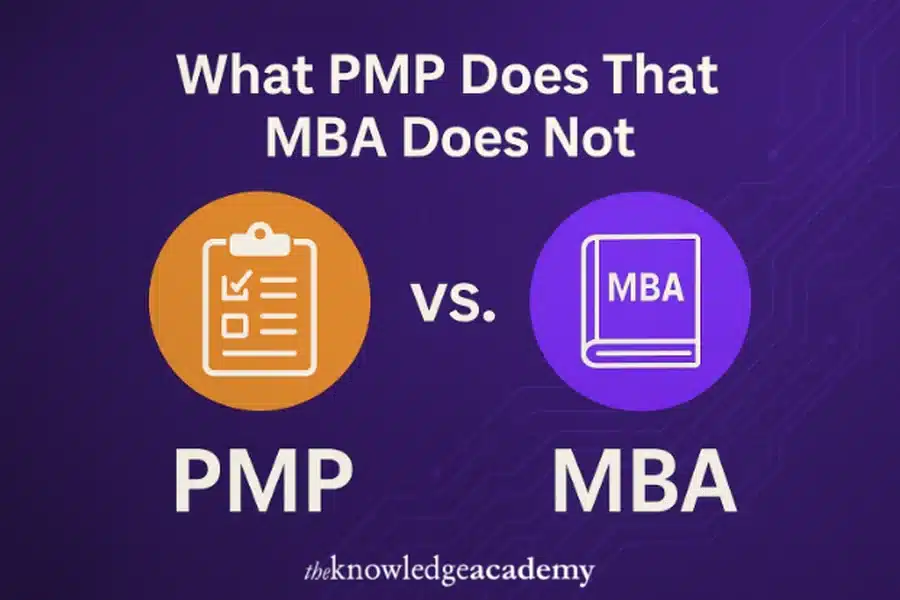Thinking about advancing your project management skills? You might be weighing a PMP Certification against an MBA. Both can boost your career, but don’t serve the same purpose. The PMP takes a different path, focusing on real-world project execution rather than broad business theory.
If you’re looking for practical skills to lead teams, handle deadlines, and manage project chaos, the PMP Certification might give you what an MBA often misses. Here’s a breakdown of what sets PMP apart and why professionals in project roles increasingly choose it as their next move.
How PMP Gives You the Edge
Unlike a general business degree, the PMP Certification focuses on skills directly impacting project delivery. It sharpens your ability to lead, manage, and succeed in project environments. Here’s how PMP stands apart and delivers value where an MBA might fall short:
Practical Focus on Project Execution
MBA programs cover various subjects, from marketing to operations and finance. Although this broad-angle perspective is useful for leadership positions, it does not probe project management details closely. Conversely, PMP Certification is meant to have a single goal: learning the art of project management effectively.
PMP dives into processes, tools, and methodologies that apply directly to real project scenarios. You learn frameworks like the PMBOK Guide, how to manage scope, and how to apply risk management techniques. In contrast, MBA courses might touch on these topics, but only at a surface level.
Where MBAs equip you to think broadly, PMP teaches you how to act decisively within a project setting. It’s the difference between learning what makes a business work and how to deliver its outcomes.
Global Recognition in Project Roles
For project managers all around, the PMP Certification is regarded as a gold standard. Because the certification guarantees knowledge and practical expertise, companies seeking seasoned project managers often prioritize PMP holders.
In contrast, the reputation of an MBA can vary depending on the school. A top-tier MBA might open global doors, but one from a lesser-known institution may not carry the same weight. PMP, however, offers consistency. It tells hiring managers that you understand industry-standard project management practices, regardless of where you studied or worked.
PMP offers a far clearer signal to recruiters about your capabilities for project-specific roles than a general MBA.
Faster, More Affordable Path to Credentials
An MBA can take two years or more to complete, not to mention the cost that can run into six figures, depending on the university. PMP Certification is significantly faster and more budget-friendly.
You need a few years of project experience and 35 hours of project management education to sit for the PMP exam. That’s a small time and cost investment compared to years of business school. Within months, you can earn a globally respected credential that opens doors across industries.
This makes PMP especially appealing to working professionals who want career progression without leaving their jobs or incurring heavy debt.
Immediate Workplace Application
PMP Certification is known for being hands-on. You learn how to lead meetings, balance stakeholder expectations, manage budgets, and avoid scope creep. These skills are tested directly through scenario-based exam questions and immediately applied on the job.
The PMP framework provides hands-on training for real-time risk handling. It emphasizes guiding professionals in the early identification of possible problems and the creation of successful mitigation plans. Unlike conventional MBA courses, which may rely mostly on theory, PMP courses improve your capacity to think critically about risk prevention and contingency planning by using genuine project scenarios.
MBA programs may offer courses on leadership and strategy, but they rarely focus on applying those lessons within a fast-moving project cycle.
Conclusion
While an MBA gives you a broad understanding of business functions, the PMP Certification equips you with practical, job-ready skills for managing projects. It’s faster, more targeted, and widely recognized in industries where project success is a key performance measure. If you aim to become a project leader who delivers real results, PMP might just be the credential that gets you there. Consider The Knowledge Academy courses to improve your project management skills and become a certified PMP professional.



